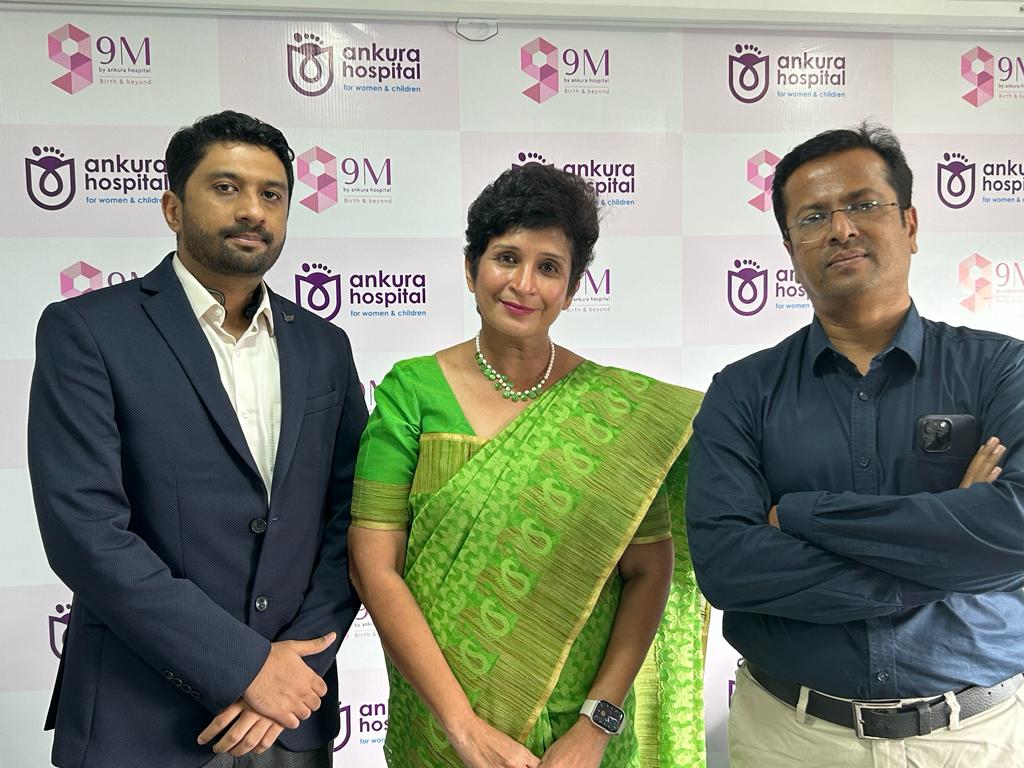Ankura Hospital in Pune successfully delivers high-risk pregnancies diagnosed with Placenta Previa and Accreta, preserving the wombs of the patients
Placenta Previa is relatively rare, occurring in approximately 0.3% to 0.5% of pregnancies · Placenta Previa is more common among pregnancies in the first trimester and usually corrects itself by the third trimester. · Placenta Accreta

Placenta Previa is relatively rare, occurring in approximately 0.3% to 0.5% of pregnancies
· Placenta Previa is more common among pregnancies in the first trimester and usually corrects itself by the third trimester.
· Placenta Accreta is even rarer, with an estimated incidence of 1 in 2,500 pregnancies
Unexpected twists can arise during pregnancy, leading to intricate and risky situations. In Pune’s Ankura Hospital, an exceptional team consisting of Dr. Supriya Puranik – the Director of 9M Fertility and a renowned Infertility Specialist, high-risk Obstetrician and Gynecologist, alongside Dr. Nikhil Hiremath – the Head of the anesthesia department and Critical Care unit performed a series of extraordinary medical feats. These involved successfully managing the complicated pregnancies of three women who were confronted with formidable challenges at nine months gestation due to an uncommon and demanding condition known as central placenta previa with accrete.
From physical discomforts, growth-restrictive babies, gestational diabetes, gestational hypertension, delivery complications, and hormonal imbalances to emotional ups and downs, pregnancy brings a roller-coaster of changes that require careful attention. However, the significance of proper management extends beyond just the well-being of the mother. It also directly impacts the health of the unborn child. Ankura Hospitals has effectively dealt with three intricate cases of women suffering from this condition, ensuring safe deliveries for all three patients.
Mrs Sonia Gupta, (name changed)* a 33-year-old housewife from Pune, was admitted to the hospital at 32 weeks of pregnancy due to excessive bleeding. Her central placenta previa was successfully treated and she happily left the Neonatal Intensive Care Unit (NICU) with her healthy baby. Similarly, Manisha Chaturvedi (name changed)*, a 30-year-old housewife from Aurangabad in her 19th week of pregnancy, was a severe case of placenta previa where the placenta had gone out of the uterine wall and trying to attach the bladder and her pregnancy was terminated at 19 weeks. The patient shifted to Pune and was advised to undergo a hysterectomy, we could save the uterus. Rupali Taneja, (name changed)*a 30-year-old housewife from Pune, also required emergency surgery to ligate her internal iliac artery to control the bleeding. The uterine portion where the placenta was attached was resected and reconstructed. All three patients received prompt and effective care at Ankura Hospitals.
Dr Supriya Puranik, Director – 9M Fertility & Senior Consultant Obstetrics & Gynecology, Ankura Hospital, Pune said, “Placenta accreta is a grave pregnancy complication characterized by abnormal placenta into the uterine wall. Placenta Previa and Placenta Accreta are two pregnancy complications that, although rare, can pose serious risks to both the mother and the baby. These conditions occur when the placenta, the vital organ that nourishes the growing fetus, does not implant, leading to potential complications. Placenta Previa and Placenta Accreta are relatively rare, occurring in approximately 0.3% to 0.5% of pregnancies. Placenta Previa is more common among pregnancies in the first trimester and usually corrects itself by the third trimester. In contrast, Placenta Accreta is even rarer, with an estimated incidence of 1 in 2,500 pregnancies.”
The exact causes of these conditions are not entirely understood, but several factors may contribute. Placenta Previa occurs when the placenta implants low in the uterus, often covering the cervix. It may be linked to prior uterine surgeries, multiple pregnancies, or advanced maternal age. Placenta Accreta is associated with abnormal attachment of the placenta to the uterine wall, often due to uterine scarring from previous surgeries like Cesarean sections. For the mother, Placenta Previa may lead to heavy bleeding, which can be life-threatening. Placenta Accreta can result in massive hemorrhage during delivery and may necessitate a hysterectomy to control bleeding, which ends a woman’s fertility. These conditions can also lead to premature birth, low birth weight, and other complications that put the baby at risk.
Dr Puranik underscored, “Managing them requires a highly skilled medical team, often including obstetricians, neonatologists, and anesthesiologists. The delivery timing and the choice of delivery method (cesarean section or vaginal birth) must be carefully considered to minimize risks. Placenta Previa and Placenta Accreta are challenging pregnancy complications that necessitate close monitoring throughout pregnancy. Women with these conditions may require bed rest, blood transfusions, and early delivery, often via cesarean section. The goal is to balance the needs of both the mother and the baby while minimizing the risks associated with these conditions.”
“Ankura Hospital stands at the forefront of providing top-notch healthcare services for expectant mothers. With state-of-the-art facilities and a team of highly skilled doctors and nurses, the hospital is well-equipped to handle successful pregnancies with ease. Dr Supriya Puranik and the Ankura team have not only saved lives but have also restored the possibility of future pregnancies. This is a proud moment for us and the achievement reminds us that the spirit of determination, combined with medical expertise, can triumph over even the most complex challenges. The expert team deserves commendation for the unwavering commitment to excellence in healthcare,” Dr Siddharth Madabhushi, Assistant Medical Director, at Ankura Hospital, Pune.






